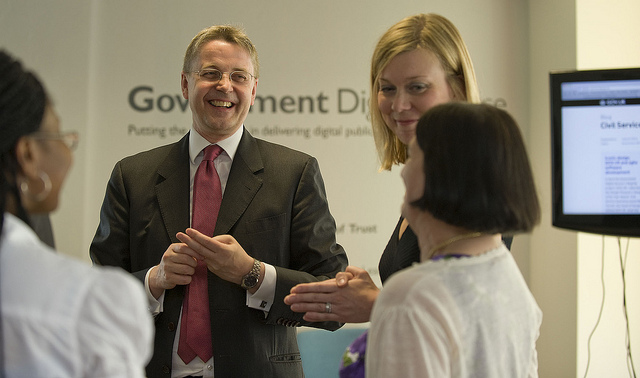Interview: Sir Jeremy Heywood on his role, the civil service, and public sector reform
As Cabinet Secretary, Sir Jeremy Heywood is one of the country’s top two civil servants, and a key adviser to the Prime Minister. Here Ben Page, the Chief Executive of Ipsos MORI, interviews him and discusses his position, the role of the civil service, and public service reform. This is part one of a two part interview that was originally published in December 2013’s Ipsos MORI ‘Understanding Society‘ magazine.
BP: Can you tell us a bit about your current role of Cabinet Secretary and how you approach it?
My role as Cabinet Secretary means that I am a policy adviser to the Prime Minister and Deputy Prime Minister and act as Secretary to the Cabinet, responsible to all ministers for the running of Cabinet government. The most important thing about my job is that it is impossible to do it without relying upon my team, the individual permanent secretaries running their own departments and Sir Bob Kerslake who runs the civil service. If you look at my diary, it is a succession of meetings, some I am attending as an advisor, some I am chairing.
I have to be able to see the wood from the trees and be able to spot the two or three things in an area that really matter. It is very easy to be sucked into the detail – there are vast amounts of paper, huge numbers of emails each day, many people wanting my time. That is particularly important when you are dealing with busy people like the Prime Minister and the Deputy Prime Minister and you have half an hour with them. If you are the sort of person who just sees this as a job 9 to 5, let’s just maintain status quo and just get out with no mistakes having been made at the end of the day, that is a wasted opportunity. I see this as an opportunity to help ministers achieve the things they want to achieve in their time in office.
BP: Do you bring any of your own vision to bear on your role?
On issues about the civil service, it is important that Bob and I do have a vision about what needs to change in the civil service as an organisation but when it comes to policy, it is very important that we do not have our own agenda. Our cue is taken from the manifestos and the coalition agreement. That is a place where quite rightly, policy is set and implementation priorities are established. It should not matter and does not matter what my personal views are. My job is to be a civil servant, if I wanted to be making decisions I would be attempting to become a politician.
BP: What would your advice be to someone in their twenties starting out on their career in the civil service?
Good question! My advice would be, it is a great career, so you made the right call if you have already decided to join us. There is no career more varied and more interesting in any other sector. So first of all, congratulations!
BP: What is the secret of a successful civil service career?
Ok so if I confine my comments to the policy civil service if you like, the Whitehall bit, which is only a small minority of the overall service. If you want to be a successful policy advisor, you really have to be rigorous in your thinking. You have to be innovative too. You cannot be stuck in the mud. You have to be prepared to be out there, talking to practitioners about what works. You have to be aware of best the thinking in academia, think tanks and in other countries. You have to be open and you have to be prepared to stand your ground. Most ministers I have ever worked with want fearless and challenging advice. They do not want yes men or yes women. Most young people that I meet are geared up for that and they are not deferential. They are reasonably tough minded. That sort of confident mindset that someone brings to bear at the start of his or her civil service career is exactly what is needed.
BP: One of the trends we see in many occupations, including inside the civil service, is the move towards greater specialisation. How does that affect the civil service overall? Does it help to be brilliant at something or can you be master of several things inside the civil service?
It has never been true that policy generalists in the civil service are amateurs; let me just nail that myth for a second. There is a specialism in providing policy advice to ministers or getting legislation through the House of Commons or the House of Lords, or helping ministers think through communications. These are all specialisms even though we do not think of them as such in our everyday language in the civil service.
We do need a broader range of specialisms now than we have ever done before: digital specialists, commercial specialists, big data analysts, contract managers, project managers, as well as the traditional specialisms of economists, lawyers, statisticians and so on. One of the challenges that we have in the civil service is to work out what constitutes a good policy generalist. How many of those special subjects do they need to have awareness of? How far do individual departments need to have a whole bank of deep experts or can we rely upon shared pools of specialists at the centre or in a department that is available to others? This is one of the organisational questions that we grapple with the whole time.
BP: Do you think having some time in Private Office is essential for anybody climbing the civil service food chain during his or her career?
It is not essential but it is definitely helpful to understand very clearly how Parliament works, how ministers work and the pressures that ministers are under. It also gives you an ability to see the wood for the trees, which is a vital role for any senior person in the civil service. So you can see in a 20-page document or PowerPoint the one or two things that really matter. For learning those sorts of skills, Private Office is one way of achieving that.
BP: Thinking about public service reform or indeed the shape of the state, Britain is in a period of fiscal consolidation. The public sector is handling that pretty well, based on at least the data I look at in terms of public perception. How do you think the relationship between government and public services has changed over the years? And do you see it changing further in the coming years?
In general, we are all going to have to become more transparent. The public will be more and more powerful in holding public services to account, either by having budgetary power or governance power. I see the trend towards more openness and more decentralisation.
BP: In your time working in government and public services, you have seen many attempts at reforms of public services. Which policies do you think have been most and least successful?
One generic lesson would be that reform programmes based on what frontline practitioners think have a better chance of being well designed and properly implemented than those just conceived purely in Whitehall. It is a bit of a cliché but involving the people involved in delivering policy in the design of policy is an absolute sine qua non of successful policymaking. Equally, we have seen under the current regime, very interesting reforms involving payment by results contracts. Transferring the risk to the private sector or the third sector and greater use of transparency. I also think the ‘nudge revolution’ and the work of the Behavioural Insights Team is incredibly powerful. We are all going to have to become more transparent.
The public will be more and more powerful in holding public services to account, either by having budgetary power or governance power. Under the Tony Blair, Michael Barber, David Blunkett regime we saw the performance of primary schools significantly improve over a short period. That was a top down approach using targets, which were successful, at least for a period. Targets can help when you have abject performance that needs to be turned into a basic minimum performance.
It depends on where you are in the performance trajectory, what technique is most powerful. Obviously different governments have their own political philosophy and a different approach is required at different times. Depending on whether you are dealing with trying to establish floor standards or whether you are trying to make something good, better or the best, different techniques apply. If you are trying to turn good or average performance into a brilliant performance, just continuing with targets from the centre does not really work. You have to incentivise and free up the managers of the service to get truly excellent performance.
—
Note: this interview was originally published in Ipsos MORI’s December 2013 ‘Understanding Society’ publication, which can be found here. It is re-posted here with permission, and represents the views of the author and not those of Democratic Audit or the LSE. Please read our Comments Policy before posting. The shortened URL for this post is: https://buff.ly/1acay5p
—
 Ben Page is Chief Executive of Ipsos MORI. He joined MORI in 1987 after graduating from Oxford University in 1986, and was one of the leaders of its first management buyout in 2000. A frequent writer and speaker on leadership and performance management, he has directed hundreds of surveys examining service delivery, customer care and communications.
Ben Page is Chief Executive of Ipsos MORI. He joined MORI in 1987 after graduating from Oxford University in 1986, and was one of the leaders of its first management buyout in 2000. A frequent writer and speaker on leadership and performance management, he has directed hundreds of surveys examining service delivery, customer care and communications.






 Democratic Audit's core funding is provided by the Joseph Rowntree Charitable Trust. Additional funding is provided by the London School of Economics.
Democratic Audit's core funding is provided by the Joseph Rowntree Charitable Trust. Additional funding is provided by the London School of Economics.
Read part 1 https://t.co/MsIUAmprma & 2 https://t.co/UIKFLTMPyJ of @benatipsosmori’s interview w/ Jeremy Heywood from ‘Understanding Society’
Cabinet Sec. Sir Jeremy Heywood: ‘if I wanted to be making decisions I would be attempting to become a politician’ https://t.co/bEGpI5w58k
RT @JohnLehal: recommend>> RT @PJDunleavy: Interview: Sir Jeremy Heywood talks to Ben Page about his role, civil service https://t.co/sJbLvc…
Good q on Citizens and state from @benatipsosmori , answer but odd- yes transparency but what else and to what end? https://t.co/2vbEsYJnoI
Also on #UK Civil Service, Cabinet Sec. Sir Jeremy Heywood interviewed by @benatipsosmori on public sector reform: https://t.co/Hy1yvBTyIl
RT @instituteforgov: Jeremy Heywood, interviewed by @benatipsosmori, sees more transparency in public services, https://t.co/Gt7zNV6SUJ via …
“@UKCivilService: RT @democraticaudit: Sir Jeremy Heywood on his role, the civil service, and public sector reform https://t.co/Ur8cGWi6Vt”
RT @benatipsosmori UK Cabinet Secretary, Sir Jeremy Heywood talks to me about what makes a good civil servant & more https://t.co/kdxAEE8YIP
UK Cabinet Secretary, Sir Jeremy Heywood talks to me about what makes a good civil servant and more https://t.co/ZpQw1rG2lA
@itsimplicit post exam fun? Sir Jeremy Heywood talks about his role, the civil service and public sector reform https://t.co/PS9p3PU4bP
“You have to incentivise and free up the managers of the service to get truly excellent performance” jeremy heywood https://t.co/mEjkukC7ed
Interview: Sir Jeremy Heywood talks to Ben Page about his role, the civil service, and public sector reform https://t.co/WrNFsDrkss
Today on DA: pt 1 of an interview with Sir Jeremy Heywood by @benatipsosmori of @IpsosMORI https://t.co/xSQHOKaGq1
Interview: Sir Jeremy Heywood on his role, the civil service, and public sector reform https://t.co/aOFEsN6VU9